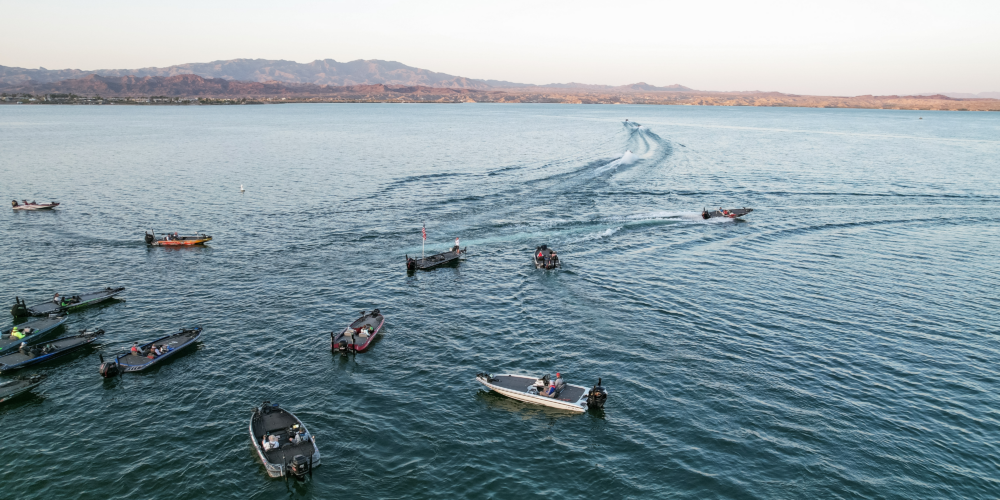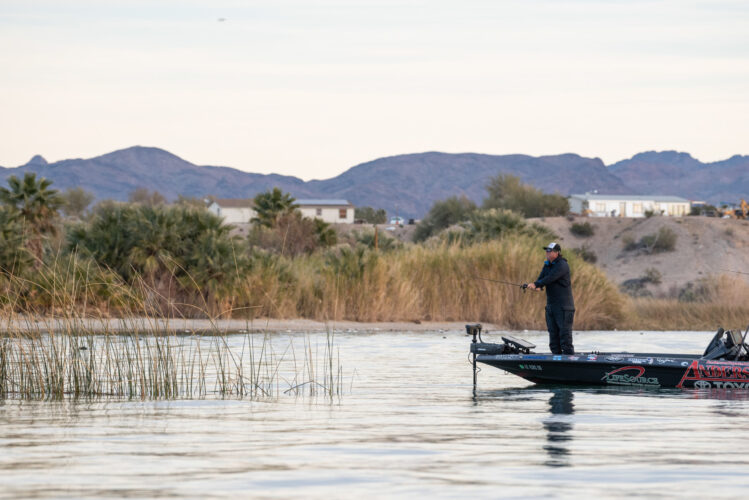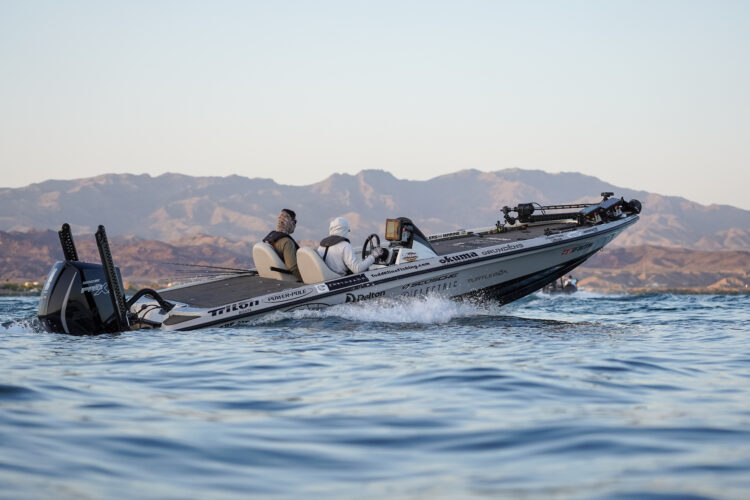Western Division getting a fresh look at Lake Havasu

LAKE HAVASU CITY, Ariz. — The second stop of the season for the Western Division Presented by Tackle Warehouse has anglers embarking on a familiar fishery at a novel time.
Lake Havasu has long been a West Coast tournament staple, but in years past, the Toyota Series Presented by Phoenix Boats has visited the Arizona-California border reservoir in February or March. With this marking the first-ever May Toyota Series event on the Colorado River impoundment, the 55 pros and Strike King co-anglers should have an easier time filling out their limits; but with postspawn bass spread all over the place, finding winning-caliber fish could prove challenging.
A handful of Havasu hammers broke down what they found during practice and offered some insight about what to expect during the three-day event. Watch the weigh-in live at 1 p.m. CT each day on MLFNOW!
Shallow or deep?

While there might be a few fish left on spawning beds, anglers believe the vast majority of Havasu’s bass have finished spawning. As is typical in the postspawn, a portion of those fish are still hanging around the shallows, while others have made the move to deeper water.
One of the primary questions competitors will have to answer is whether to chase the shallow or deep bite. Havasu offers plenty of habitat for both options. The narrow, riverine portion of the reservoir is full of shallow points and pockets, while the lake’s bowl-shaped section offers deeper flats where bass congregate around manmade, offshore habitat. There’s also shallow grass in both sections.
Lake Havasu City native Roy Hawk thinks both deep and shallow fish will account for strong finishes.
“I think fishing your strength is going to be your best advantage,” Hawk said. “There’s just fish spread out all over, and I’ve caught pretty good ones doing a whole bunch of different things, from flipping to fishing out deep. If I was the world’s best flipper, I would be flipping. If I’m the drop-shot king, I’m going to be drop-shotting.”
Todd Kline, who won last year’s Toyota Series event on Havasu in early February, thinks the deep bite might be the way to win. He said the water is lower than he expected, and he didn’t find many shallow fish during practice. Fellow Arizona native Zach Verbrugge, on the other hand, agreed with Hawk, saying he thinks the tournament could be won either shallow or deep – or, better yet, by finding patterns in both depth ranges.
“I feel like whoever is going to win it is going to be doing both,” Verbrugge said. “They’ll probably start shallow in the morning, and as the day progresses, they’ll probably move out deep. A good majority of the fish are out deep right now, but there’s still quite a few up shallow cruising around and whatnot.”
As for techniques, Hawk expects frogging and flipping to rule the shallows. Those who concentrate on deeper water will likely utilize deep crankbaits, Carolina rigs, drop-shots and other finesse offerings.
Making the most of the mornings

While Kline has quite a bit of experience on Havasu, he’s only fished the lake once at this time of year, and it wasn’t during a tournament. Several other anglers likely find themselves in the same boat.
Hawk said there are some similarities between productive prespawn and postspawn patterns on the fishery, particularly offshore. The big difference is that, right now, anglers can expect to get more bites, but it can be hard to find the caliber of fish to contend for the win.
“In the wintertime, you’re only going to get like six bites a day, versus this time of year, you can catch 20 fish throughout the day, just because it’s that good right now,” Verbrugge explained.
One reason the Toyota Series typically visits Havasu earlier in the year is the lake’s desert climate. Anglers are going to have to battle the heat this week, as the forecast is calling for sunny skies and highs in the 90s every day.
While Hawk said the fish on Havasu seem to like the sun – and that it can sometimes predictably position them along shade lines – all three anglers noted that it will be particularly important to get off to strong starts each morning.
“You’ve got to make the most of your time in the morning,” Verbrugge said. “Once 12 o’clock rolls around, the bite window definitely shuts off.”
“That’s every angler’s dream to get them early because it eases the nerves,” said Kline. “I just think your best bet of getting some big ones is going to be early, and then it will be the old cliche grind for the rest of the day.”
What will it take?

The array of species swimming in Havasu includes both largemouth and smallmouth bass. Kline mixed the two en route to his win a year ago.
This time around, anglers think the winning total will be comprised primarily of green fish. While there might be a smallmouth or two mixed in, Hawk said the smallmouth haven’t started congregating in big schools yet, and Kline said the ones he’s caught in practice have been skinny from the recent spawn.
“I think in order to contend, you’re going to have to have a bag of all largemouth,” said Kline. “If you came across a nice, 4-pound smallie, I think that would help you, but I think the majority of the smallies are going to be in that 2- to under 3-pound range. Even some of the ones that I’ve caught in practice that would normally be over 3, they’re just real skinny right now.”
As for the winning weight, 20 pounds a day has historically represented the benchmark to hoist the trophy on Havasu. Hawk, Kline and Verbrugge are split about whether that will hold true this week. Verbrugge thinks a 60-pound total sounds about right, saying “Someone always catches 60 pounds for three days, no matter what.” Meanwhile, Kline expects it could be a bit less, while Hawk thinks it might even take more.
“I think it’s going to be a pretty good bite,” Hawk said. “I expect to see at least a couple 20-pound bags a day weighed in. I would stay around 60 (to win). But it could easily take more. Occasionally we’ll get like a 25-pound bag in May, so it’s doable.”
“Normally, you’d say about 20 pounds a day will win it,” said Kline. “I personally think it will be a little less than that. But we’ll see.”